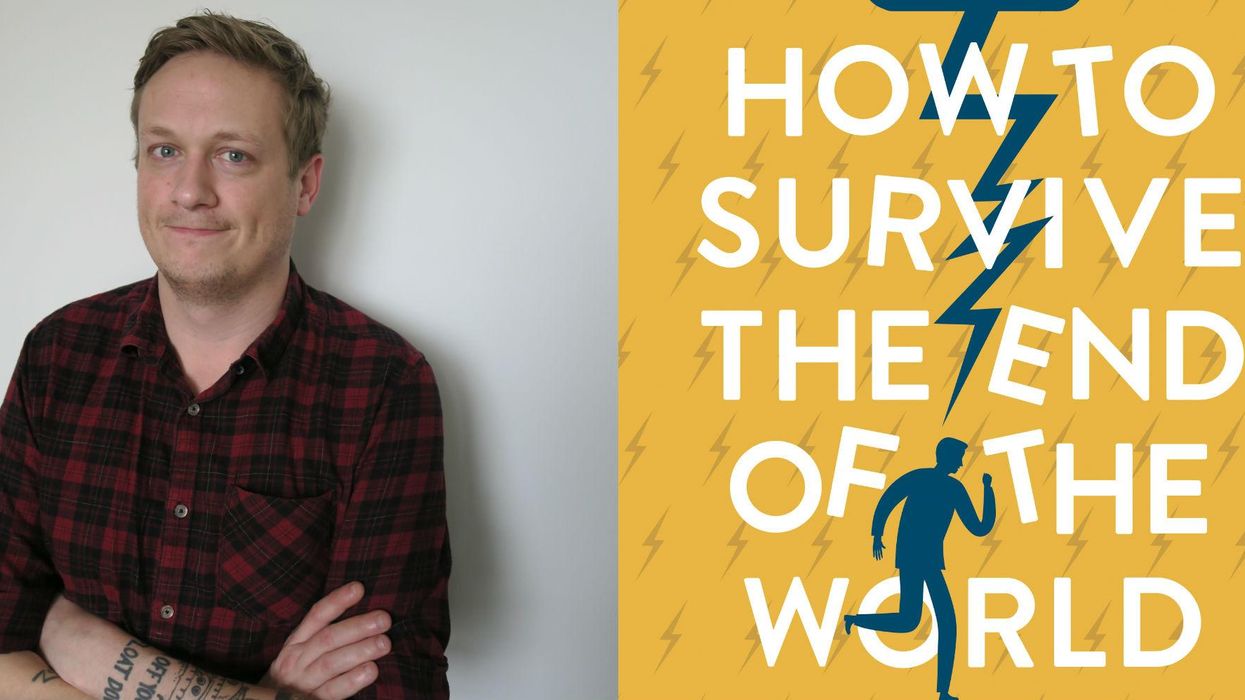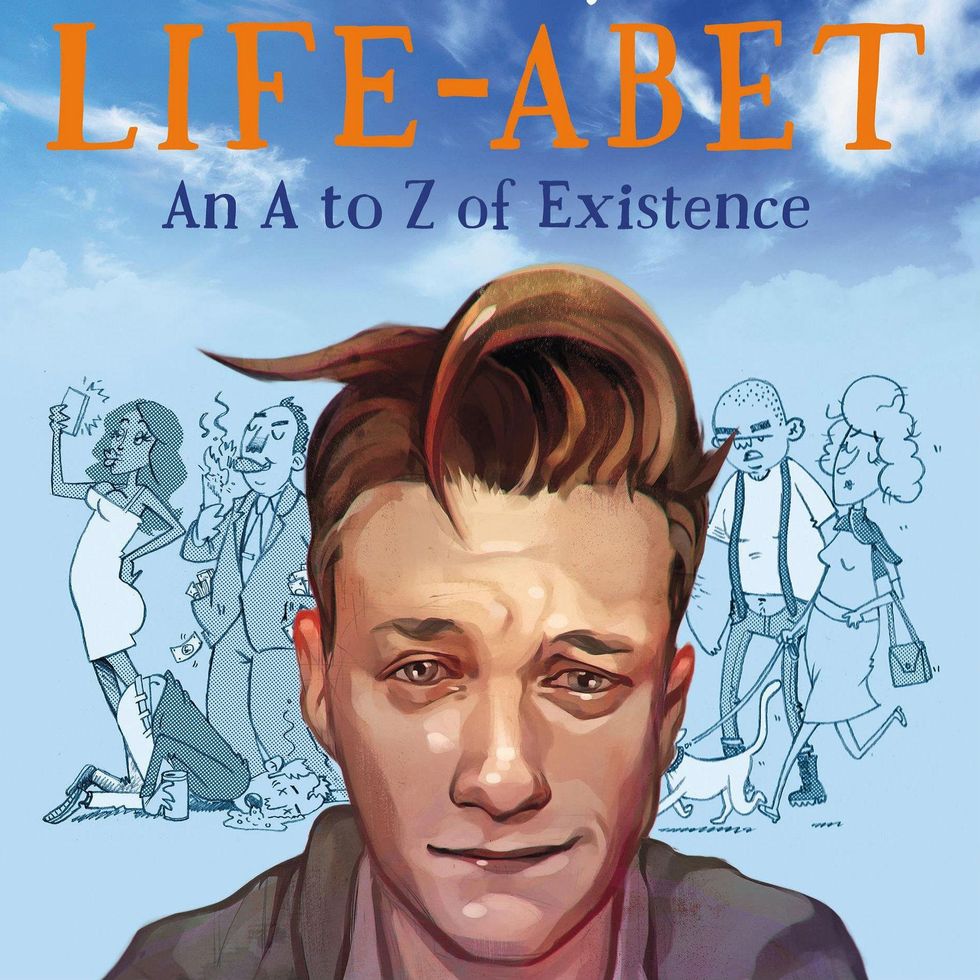Celebrities
Lowenna Waters
May 17, 2018

Picture:
Aaron Gillies / @technicallyron
If you thought that a laugh-out-loud book 'self help' book about mental health issues wasn't possible, think again.
Aaron Gilles, aka Technically Ron on Twitter, has done just that with his latest offering, How to Survive the End of the World (When It's in Your Own Head), which is about his struggles with the mental illness anxiety that according to Mental Health Org affects 8.4 million people in the UK alone.
A comedian and author, Aaron has written widely on mental health. His first book, Lifeabet: An A - Z of Modern Existence, was published in 2016, and tackles the subject of the author's depression. He's also contributed to titles such as The Huffington Post, The Telegraph and The Guardian, where he's documented his struggles.
Aaron first began writing about mental health on his Twitter account as a way to deal with his depression. Despite not feeling confident enough to talk about his struggles with people face-to-face, it offered him an outlet to express how he was coping. To his surprise, his quips got a great reaction.
Writing from personal experience, the book's primary aim is to make suffers realise that they're not alone, as well as offering advice on how to cope with anxiety, whether that's with medication, therapy, CBT, or comedy.
We catch up with Aaron while he's on holiday in the south of France, and when we first try to get through to him, we're awkwardly put through to a total stranger first, which feels apt. We're interested as to why he's decided to focus this book on anxiety in particular:
Despite the fact I know first hand that it is a horrible, horrible disorder, it seems that 90 per cent of the literature out there deals with depression. And I think when it comes to things like anxiety, PTSD, and post-natal depression, which are huge things that take over people's lives, we still know very little about them.
Because anxiety is relatable, and many people will have felt it at one time or another, Aaron thought that tackling the topic in the book would be a good way of normalising it.
I just thought it was such a relatable way of bringing the mental health conversation to an audience that not just people who had been through this disorder would get.
When he was writing this book, he was keen that it wouldn't turn out like a classic 'self help' book, although the finished product does offer many pragmatic pieces of advice that suffers can incorporate into their day-to-day routine.
I've read a lot of other books on depression and mental health issues and they all follow a very linear 'This is my story and this is how you could get through it,' without the explanation to the reader that this could help you, this could get you through.
Mental health issues are all unique, so he's not offering a one-size-fits-all cure. Instead, he hopes readers will be able to take away morsel-sized bites of helpful information.
If you can take away a few sentences from a few chapters and incorporate them into your daily routine, then that's going to be so helpful. That's what worked for me, just seeing the odd sentence, and thinking wow!

One of the things that really marks Aaron's book out from others on the market that tackle the topic of mental health is that it's quite simply laugh-out-loud funny. He manages to harness the ludicrous, the awkward, and the down right bizarre things he's done because of mental health issues, and turn them into hilarious anecdotes.
We wonder whether this focus on comedy is purposeful? Whether it's one of the tools that he employs in his arsenal fighting mental health issues?
I find it difficult to laugh myself, so if I can make others laugh, it helps me through osmosis. I like to make light of it because it's such a dark and deep subject to cover. Using comedy makes it more accessible in some ways, and brings it to new audiences who possibly wouldn't have read something like this before, because they were going through 300 pages of misery!
The book also works to normalise anxiety and mental health issues - especially in men, as Aaron is very open about his struggles. Male suicide is still the biggest killer of men under 45, which is astounding. In the UK, male suicide rates remain consistently higher than female suicide rates, most notably 5 times higher in the Republic of Ireland, and 3 times higher in England and Wales.
I never wanted to be a specific advocate for male mental health, but it's just such an important conversation to have. There have been a massive rise in diagnoses in the last few years, and that's mostly comes down to the fact that high profile people like Prince Harry and Bruce Springsteen are talking about their experiences.
Men are far less likely to open up about their mental health issues to their mates over a pint than women, meaning they keep things inside, and can feel shame surrounding their conditions.
I don't want to use the phrase 'toxic masculinity', but men are taught to be defensive, to be stubborn, and to be proud. So men start to ignore their emotions, but that can only go on so long until everything is bottled up and comes out in another way, which you can see in the rise in suicide rates in the last ten years. The NHS is now referring to male suicide rates as at an epidemic level. It's so important that we talk about these things, so the more voices that are out there, the more able people will be to relate to it.

One of the quirks in the way Aaron has written the book is that it's almost structured like he's in a dialogue with his own brain. He explains that the reason he's done this is...
...because when it comes to issues like this, your brain is your worst enemy, and you're constantly fighting against it. The conversations I have with my brain are very much the inner conflict that goes through my head on a day-to-day basis. It's a constant battle. Living with a mental health disorder is going through loads of tiny battles and you have to live with these every day, and if you can even get through a couple, you're on the right path.
It's important to note that despite being a divisive subject, Gillies always argues that social media has been a help to his mental health, not a hindrance. He is a prolific tweeter, and throughout the book, he evangelises how useful social media can be as a way to communicate with other people who are suffering from anxiety, but also meaning that you don't need to leave the house - or your blanket fort - to do so.
I was in a place where I couldn't go outside, I wasn't doing anything, and Twitter became my social outlet. I essentially had a support network in my pocket that I could talk to and I could discuss things with.
Finally, I wonder if he has any more advice for someone that may be struggling with a mental health issue. Social media is full of people who are enthusiastic about his work, and he gets daily DM's and messages saying that his book is the reason someone has had the confidence to come forwards about their mental health issue.
As I say throughout the book, I'm not a trained professional, I'm just a sufferer. I'm not the person to speak to. See a GP if you're comfortable to, otherwise use one of the mental health services that are now free with most councils.
He continues:
The main step is that moment of going, I think I have something wrong with me. That moment of going, I need a helping hand, I need a shoulder. That's the biggest step.
The reaction to the book has been incredibly positive, and has already encouraged other suffers to open up about their struggles, or to seek help. The more people talk about mental illness, the more stigma is combatted, and the less fear surrounds the topic in the general population. For Ron, that's the whole point:
What I wanted with this book is for people to read little bits of this book, and go, this has helped me. And if you can take more away than that then that's amazing. But I thought that's the most important part.
Judging by the multiple testimonies posted on Twitter and other social media platforms by people that have read, loved and been helped by the book, he's achieving his aim.
More: 13 things you should never say to people with mental illness
More: These are the mental health symptoms you should never ignore
Top 100
The Conversation (0)













